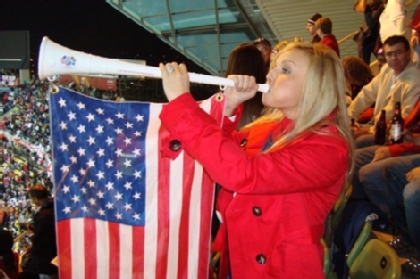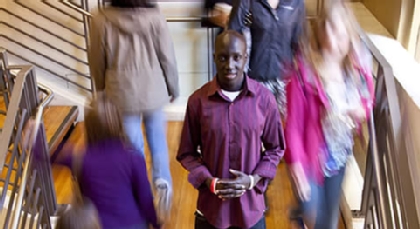Page 51 • (833 results in 0.052 seconds)
-

veteran: vet-er-an (n) \ ˈve-tə-rən a veteran – whether active duty, retired, discharged, or reserve – is someone who, at some point in their life wrote a blank check made payable to the United States of America for an amount “up to and including their…
intimate bond built that someone who has not served will have a hard time understanding. This bond is built through teamwork, long hours, crappy assignments, complaining about everything together, and also enjoying the off time together. No matter someone’s background, culture, race, religion, or sex, the bond brings us all together. And humor is paramount to making it through all of the rough times. Tami Walsh Women’s Army Corps 1978-1980, Communications Specialist PLU Transcript Specialist, Office of
-
Thursday, March 4 - Symposium in Downtown Tacoma Opening Reception (5:30 pm - 7:00 pm) Location: Greater Tacoma Convention & Trade Center, Foyer Keynote 1 (7:00 pm - 8:45 pm) The Olympic Games,
, teacher and mountain guide Natalie McCarthy ’09, Paralympian-in-training Matt Kennedy ’07 Art Thiel ’75, sports writer Moderator: Samuel Torvend ’73, Associate Professor of Religion Location: University Center, Chris Knutsen (CK) Hall
-
Jump to Fast Car by Tracy Chapman
title designated by the academic unit. (1 to 4) SOCI 391 : Sociology of Religion - SO An investigation of the American religious scene with particular emphasis on the new religious movements, along with attention to social settings and processes which these new religions reflect and produce. Prerequisite: SOCI 101, one religion course, or consent of instructor. Cross-listed with RELI 391. (4) SOCI 410 : Social Stratification A, SO An examination of the cultural and structural causes of social
-
My decision to be a WMGS major was the culmination of my intro class and a personal belief that gender equality should be a priority. The program has been great!
was suddenly looking at the world through a whole new lens. One of the things I love most about WMGS is that we’re a cross-disciplinary major. As a WMGS major, I’ve had the chance to dip my toes into sociology, psychology, history, religion, and global studies. I feel like one of the strengths I’ve gained from being a WMGS major is the ability and desire to look at a situation from all possible perspectives. I discovered my passion in WMGS, and I know that no matter where I go or what I end up
-

PLU alum gets a ringside seat to history as U.S. plays in World Cup Last month By Barbara Clements PLU alumna Kelsey (Dawson) Goodson, ’08, accompanied her husband and U.S. soccer player, Clarence Goodson IV, to South Africa to represent the U.S. team at the…
. While at PLU I majored in communications with an emphasis in public relations and advertising and a minor in Religion. At the Red Cross I also help to plan and coordinate fundraisers, promote events, and work as a liaison with media. Volunteering at our home church in Norway, I am coordinating a trip to Israel, and work with media. My education at PLU has been so helpful. It’s opened doors and helped me utilize my skill set in a new country. Read Previous A generous couple Read Next Hebrew Idol
-

When we first catch up with environmental advocate Andrew Schwartz ‘07, he’s preparing for a massive road trip with his wife, Emily, and 8-month-old daughter, Maja. They’re headed east to visit Emily’s family in Illinois. But the 36-year-old Schwartz’s life has also been a journey,…
supportive teachers, including Guerrero. For his Capstone project, Schwartz studied the sociology of religion. He realized the commonality of contemplative questions—what does it mean to be alive? Why are we here? Why do we believe the things we believe? “For me, as I learned more, I questioned more,” he says. “PLU helped me begin to understand questions that needed to be asked, which helps you ask better questions next time, and be OK when answers are messy or nonexistent.”From PLU to Planetary Change
-

By the time she earned the university’s highest degree, she left with more than a shiny new title. The nurse practitioner for Providence Medical Group at Hawks Prairie Internal Medicine in Lacey,
Molly Martin’s full story Applying Psychology to Marketing Analytics (formerly Marketing Research) Nicki Clifford graduated from PLU with a Bachelor of Science in psychology with minors in politics and government as well as religion. She continued her studies at PLU to gain a Master of Science in Marketing Research. “The MSMR program relates to my undergraduate studies because we delve deep into psychographics and geodemographics, which leads to a more comprehensive view of the human experience
-

In January 2006, a group of PLU students — bundled up in warm coats, gloves, hats and sturdy boots — stepped carefully from the boat on which they’d been traveling onto the rocky and icy shores of Antarctica. This intrepid class helped seal a spot…
studied away twice so far, and I’ll be going one more time. My first study away experience was my sophomore year, when I spent J-term and spring in Trinidad & Tobago. My junior year, I took a J-term religion course with Professor Finitsis in Athens, Greece. Finally, this fall I have been accepted into an international honors program that’s actually going to three different countries — I’ll start in New York City and then go to Nepal, Jordan, and Chile, studying human rights advocacy. On choosing a
-
Course Development Stipends For new or existing courses in the Innovation Studies Minor With the generous support of donors to the Innovation Studies program, the INOV Steering Committee invites all PLU faculty to submit a proposal for a stipend to support the development of a new or existing course in the Innovation Studies minor. Options...
, violence, gender, ethnicity, religion, and environmental concerns. HIST 248 – Innovation, Ethics, and Society – SO (4) PHIL 248 – Innovation, Ethics, and Society – PH (4) Two courses covering a history of innovation, problem solving, and creativity in the global economy, emphasizing the ethical considerations that arise as a result of new products and initiatives, disruptive technologies, globalization, and cultural change. Both courses emphasize clear writing and communication practices, teamwork, and
-

Lost Boy of Sudan By Chris Albert The table in David Akuien’s South Hall apartment is covered with textbooks and worksheets, filled with meticulous notes. He sits down at the table and spends hours studying – this day it’s for an environmental studies test. David…
Lutheran University. This May, Akuien (pronounced “A – Q – En”) will graduate with a double major in communication and political science with minors in conflict resolution and religion. The first years of his life were spent traveling, or rather escaping from the horrors of a civil war in Sudan. “I was born into this chaos right away,” Akuien said. He is one of almost 4,000 “Lost Boys,” who escaped a life of war and faced the fear of the unknown for a chance at a better life in America. “Luckily, I was
Do you have any feedback for us? If so, feel free to use our Feedback Form.


